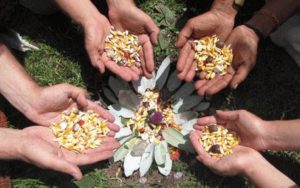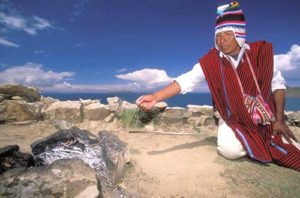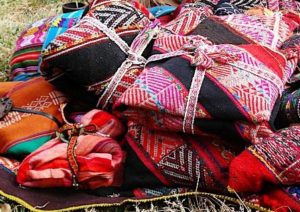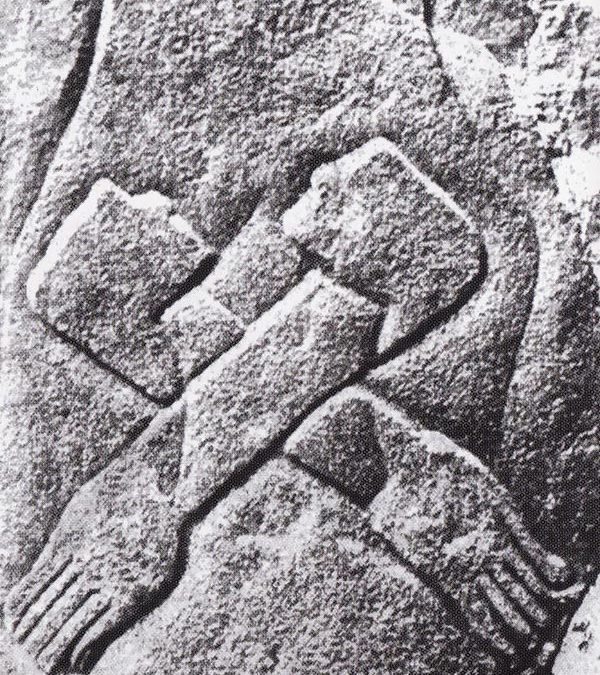In the Andean worldview there is a principle called Ayni. Ayni is the principle of reciprocity, and in it, all relationships are based on Andean culture. This principle applies to social and cultural relationships, the relationship of the person with nature, with others and even the relationship of the person with the spirit world.
In western culture we could talk about a different model in which importance is placed on the person, the self or in the hegemony of one culture over the others as well as in the contemporary. This model is based on reason as a principle of knowledge.
The Ayni is pictured in very old temples as two hands crossing each other. In pre-Hispanic drawings, especially in textiles, you can find designs of this type, represented as two lines intersecting diagonals, separating four spaces.
This principle has been known since ancient times and it is difficult to understand it from the models of reason and of mechanistic physics. It is somewhat more easily understood through quantum physics as it suggests that a fact is never separated from another and that there are almost infinite relationships between processes.
It is based on an energy principle that tells us that if we exert an action in one direction, we will have a response that corresponds to the action we have taken. Nonetheless, it is not due to the process of physics action-reaction mechanics. It is a knowledge that teaches that there is reciprocity in the relationships that you have with a person, with others, with animals, with plants, with air, with fire, with nature in general. Thus, through the principle of reciprocity, one must give in order to receive.

Offering
Andean culture considers that phenomena is not isolated, that everything is related and that if we want something from the land we must give it something first. In general, in the indigenous cultures of Peru there is the belief that everything has life, has energy and spirit. It will not have a spirit similar to that of the person. In the case of the Andean-Amazonian tradition, plants are considered to have a collective spirit according to the species, animals, and the land. For instance, mountains, rivers, and all those places we call places of power have their own very particular energy.
In Western materialistic culture this is unthinkable. If people don´t even have a spirit, how are animals, plants and much less places considered to have one. Most of the phenomena are isolated and there is no demonstrable relationship with other phenomena. What is sought is the repetition of results, and a guarantee in the processes, in order to be able to demonstrate a theory.
Ayni is difficult to understand if we do not see the relationship of people with everything, with nature, and with our ancestors. If everything is related, and we establish a destructive relationship with nature, we will have a corresponding answer. In the Andean-Amazonian culture there is the concept of «Cutipar» which means that if you harm a certain tree, a plant or if you kill an animal without the due respect, their energy or spirit can affect yours for having acted inconsiderately. There is still the custom in many indigenous people to thank the spirit of the animal after hunting them for allowing them to feed them, or asking a plant or tree for permission before cutting it down and making an offering with tobacco when you are going to use a medicinal plant.
The disease in the Andean-Amazonian culture, except on rare occasions, is considered to be caused by a disorder in the relationship of the person with himself, with others, or with nature. This Disorder causes the person to separate from the body and makes the person sick. The person begins to feel disconnected from others and from nature, and feels isolated.
Health is the recovery of order. The shaman’s role is to restore that balance in the person, by helping them recover the relationship of harmony with nature and with themselves. To help them find balance with their spiritual and material life, their feminine and masculine parts, as well as with their relationship with their surroundings, their body, and with others. Always bearing in mind that the actions we take have a positive and negative impact on our lives, and that even the actions taken by our ancestors can continue affecting our lives. These must be healed so that we can function from the balance that allows us act from our true being and essence.
When the person believes himself isolated from the environment and from others, many times he feels above his surroundings. This is how they begin to prey nature, as it does not feel any connection to it. To reach the levels of destruction of nature which we are currently in, the person has previously had to prey on their internal world.

Andean Shaman
There are different techniques that are used to restore this principle of order and reciprocity. Some of them have remained in the Andean culture, in the form of payments, offerings, pilgrimages and others are typical of Amazonian cultures such as the use of diets and master plants, to restore the spiritual order.

Ritual
These techniques are complementary and are based on the idea that behind this apparent, visible world, there is an invisible world. A world of energies that sustains everything we capture with our senses. Such techniques constitute a work that restores order between the two worlds, recovering the harmony between the person and his universe of relationships.

